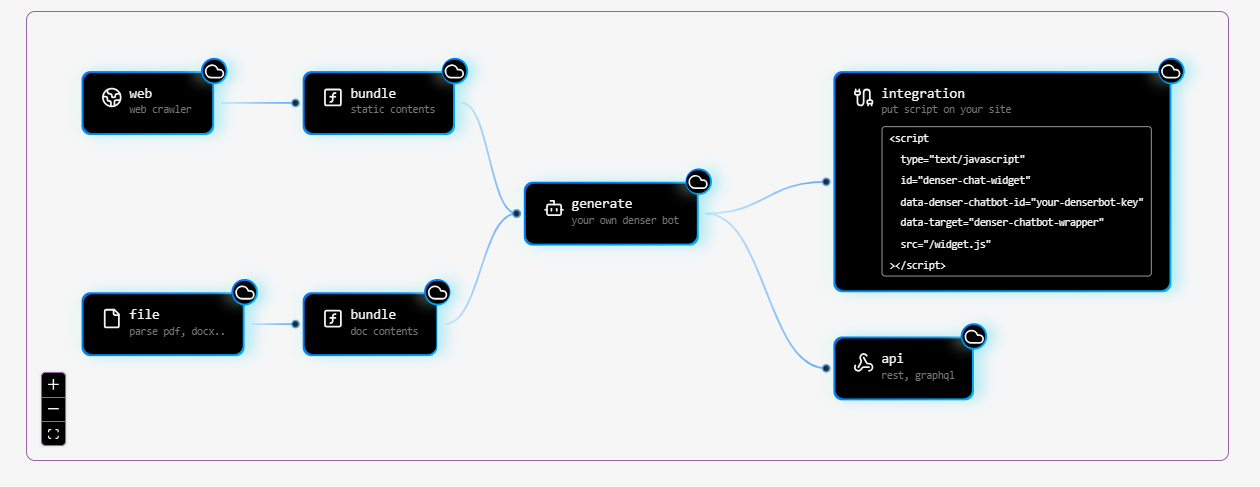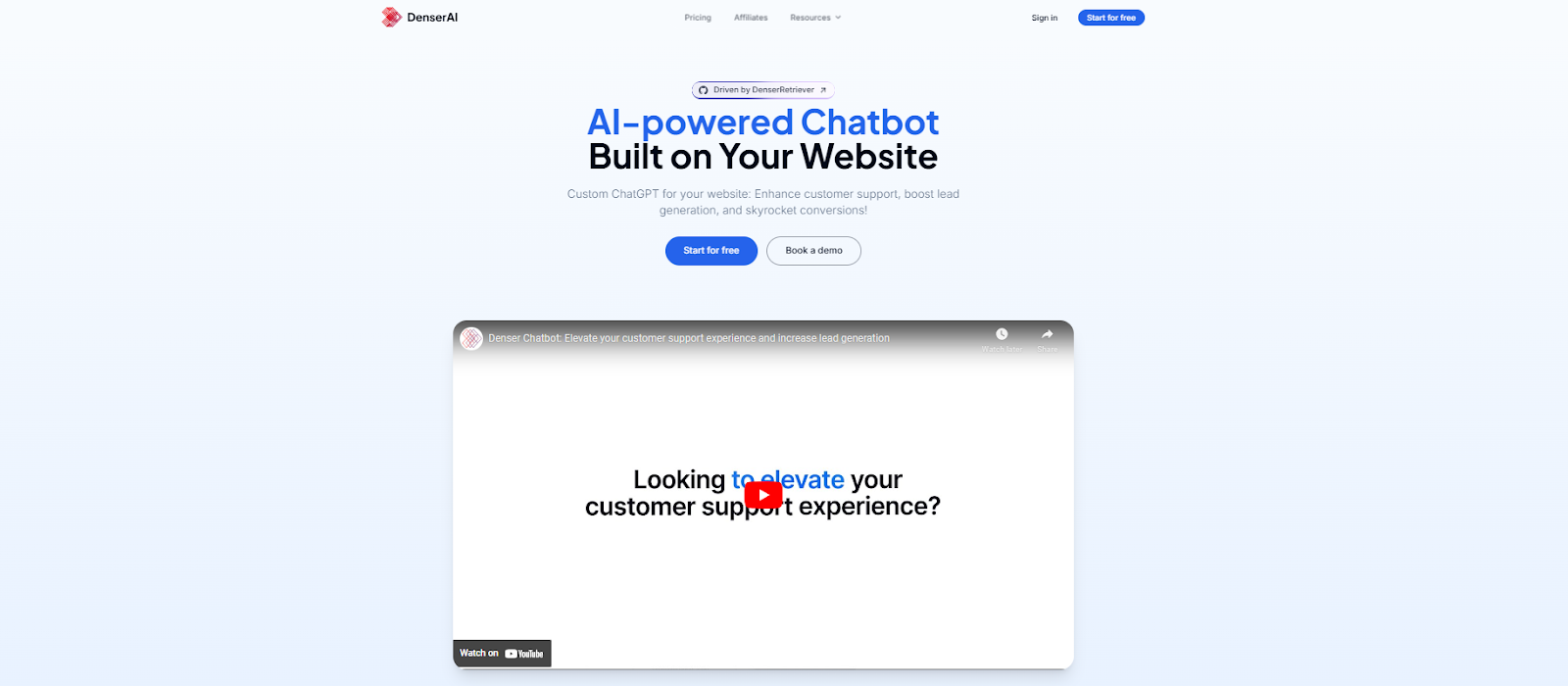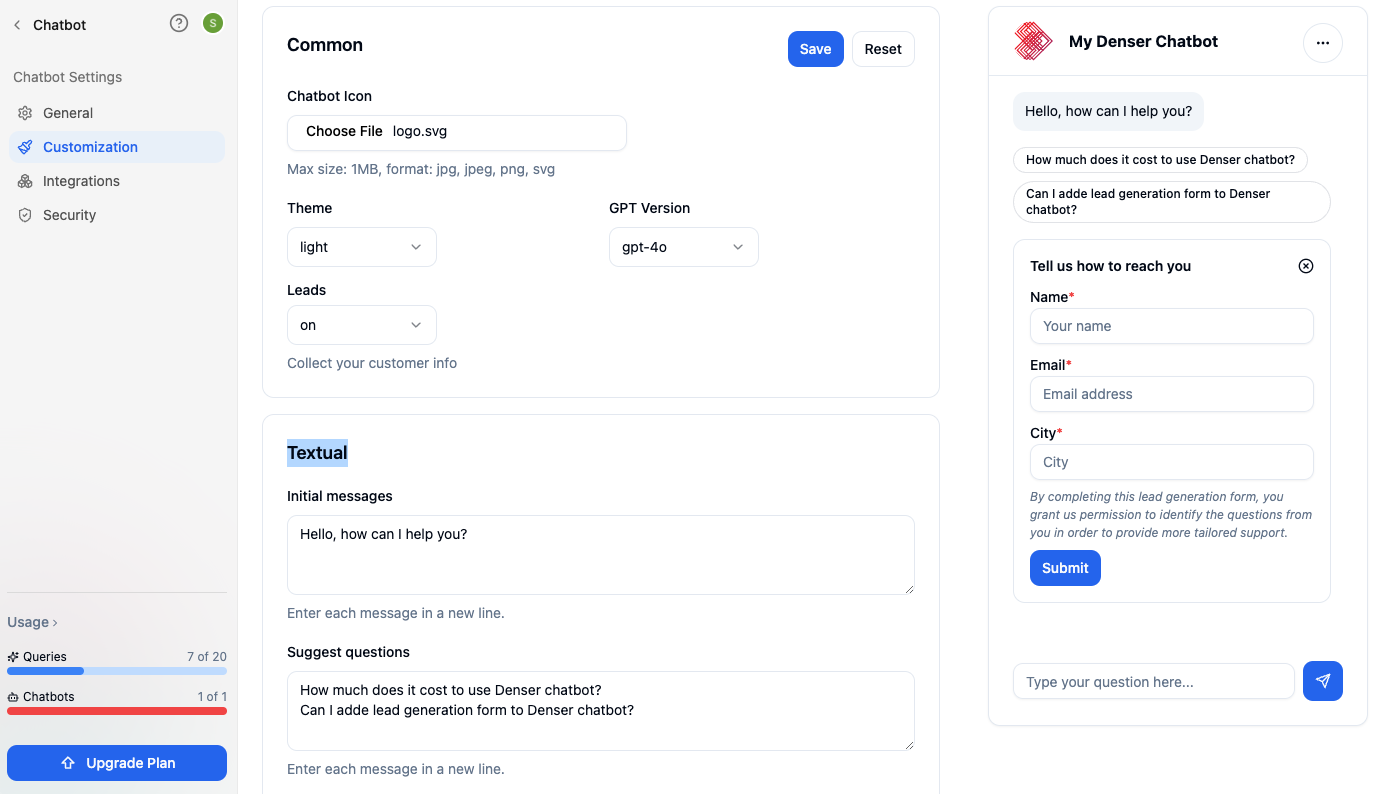
Enterprise AI Chatbot Benefits and Use Cases

How do businesses provide instant, personalized support to millions of customers at once?
The answer is enterprise AI chatbots. They are used to assist with queries, provide personalized recommendations, and even take on roles similar to additional customer service agents.
Enterprise AI chatbots help increase customer satisfaction by delivering quick answers and resolving issues in real time.
Customers never have to wait for help, which creates a better and stress-free experience. Happy customers are loyal customers, and these chatbots help businesses build that trust.
In this article, we'll explore why integrating enterprise chatbots into your system can transform customer interactions on your website and show you the steps to do it.
Easily create an enterprise AI chatbot with Denser today!
What is an Enterprise AI Chatbot?#
Enterprise chatbots are high-powered, multitasking digital assistants for big businesses. They run on artificial intelligence, which lets them handle all sorts of tasks, from chatting with customers to organizing internal workflows.

These bots are designed to take on heavy loads and manage multiple tasks across different departments at once. This can be anything from pulling up sales data on the fly to scheduling meetings or even handling standard customer service questions.
Enterprise chatbots work by keeping things running so that human support can focus on more strategic or creative tasks.
Benefits of Using Enterprise AI Chatbots#
Enterprise AI chatbots are built to meet the complex needs of large organizations. These advanced systems are great for automating tasks and simplifying business processes. Let’s take a closer look at the main benefits that define enterprise AI chatbots.
Real-Time Support#
Unlike basic chatbots that handle only FAQs, enterprise AI chatbots can manage intricate user queries by integrating with advanced backend systems.
Customers often expect immediate solutions, especially for urgent matters. Enterprise AI chatbots can retrieve data from integrated systems. It helps avoid long wait times that are common with traditional customer service.
Unified Customer Communication#
A single chatbot can operate across different platforms while maintaining consistent interactions. Customers can switch between channels without losing context or needing to start the conversation over.
Unified communication isn’t just for customers. Chatbots can also speed up internal communication by connecting employees across platforms like Slack, Microsoft Teams, and email.
Proactive Engagement#
Enterprise AI chatbots use data and triggers to identify the right moment to engage a customer.
If a customer leaves items in their online shopping cart without completing the purchase, the chatbot can send a message offering help or a discount to encourage checkout.
Advanced Personalization#
Unlike one-size-fits-all solutions, chatbots for enterprises use comprehensive customer insights from past interactions to personalize conversations to individual preferences. Therefore, customers feel recognized and understood, as if interacting with someone who knows them well.
Chatbots can also adjust their communication style based on customer behavior. If a customer prefers concise responses, the chatbot learns to provide information more directly.
Similarly, if a customer engages more when provided with detailed explanations, the chatbot adapts to accommodate that preference.
Cost Savings#
AI chatbots can handle tasks that would otherwise require human agents. They are capable of managing thousands of customer interactions at the same time.
Training human agents can be time-consuming and costly. Enterprise AI chatbots don’t need onboarding or ongoing training for every task. Once programmed, they are ready to work, and updates can be applied across all interactions.
Scalability#
As your customer base expands and interaction volumes increase, chatbots can easily handle the growing demand without the need to increase staff proportionally. They are beneficial during peak periods or special promotions when customer inquiries and transactions can spike dramatically.
Moreover, chatbots adapt and learn from each interaction. As they become more efficient, they can handle even more complex tasks, which allows your business to scale operations smoothly.
Data Insights#
As chatbots engage with customers, they track patterns and trends in the questions asked and the feedback provided.
If many customers ask about a specific product feature or encounter a common issue, the chatbot's data can highlight these areas as opportunities for improvement or clarification.
Enterprise chatbots serve as both a point of interaction and a source of valuable insights, which helps businesses not only meet but anticipate their customers' needs.
Escalation to Human Agents#
Enterprise chatbots are designed to know their limits. When they detect a complex issue beyond their scope, they seamlessly escalate the conversation to a human agent.
The chatbot provides the agent with a summary of the interaction so customers don’t have to repeat themselves.
How to Build an Enterprise AI Chatbot For Your Website#
Creating an enterprise chatbot that supports your business operations can seem daunting, but it doesn't have to be. Here's a how to build a chatbot that's both powerful and efficient:
1. Define Your Goals#
Start by identifying the challenges or areas within your business that could benefit from automation or improved interaction. Once you know what problems you want to address, set clear and measurable objectives.
If improving customer service is your goal, your objective could be to reduce response times from several hours to a few minutes. Clear objectives will provide direction and a way to measure the chatbot's success later on.
2. Understand Your Audience#
You can start by gathering basic user demographic information, such as age, location, and job roles. This data can help tailor the chatbot's language, tone, and the level of complexity in its responses.
A chatbot serving a tech-savvy audience might use more technical jargon than one aimed at general consumers. Identify your audience's main challenges or needs that the chatbot could address.
Also, consider how your audience prefers to communicate. Some users might favor quick, text-based interactions, while others might appreciate more detailed, conversational approaches.
3. Choose the Right Platform#
Picking the right platform for your chatbot is a big decision that affects how well it works for your business. The right platform should match your goals, technical skills, and the complexity of your needs.

Denser.ai is an intelligent chatbot platform that allows for easy customization. You can integrate it into your website in less than five minutes. You can adjust responses, features, and integrations to fit your business perfectly.
Try a free trial of Denser.ai or schedule a demo to learn more about their features.
There are two main types of chatbot-building tools:
AI Frameworks#
Platforms like Google's Dialogflow and Microsoft's Bot Framework cater to those with programming skills. These frameworks are designed to build sophisticated, learning chatbots that make personalized recommendations based on user interactions.
They offer extensive integration with other systems and services that are suitable for creating complex, intelligent chatbots.
Chatbot Platforms#
No-code chatbot builders provide a powerful solution for beginners or those looking for built-in features.

Enterprise chatbot platforms like Denser.ai feature easy-to-use interfaces with drag-and-drop functionality and pre-built templates. These platforms are excellent for setting up chatbots that handle common queries or improve user navigation on your website.
4. Design the User Experience#
The user experience (UX) of your enterprise chatbot plays a huge role in how effective it will be. A well-designed chatbot should be easy to use, engaging, and helpful. The better the experience, the more likely users are to trust and continue using it.
The first step in designing the UX is understanding who will use the chatbot and why:
- Who are your users? (e.g., customers, employees, or both)
- What problems do they need to be solved? (e.g., tracking orders, getting product recommendations, or troubleshooting)
- Where will they interact with the chatbot? (e.g., website, mobile app, or social media)
If your audience includes tech-savvy users, you can use advanced features like voice commands. If they prefer simplicity, stick to clear text-based interactions.
5. Develop and Train Your Chatbot#
With your platform selected and your user experience outlined, it's time to build your chatbot.
There are three main approaches to chatbot development. The choice depends on your resources, skills, and the complexity of your chatbot’s tasks.
No-Code Platforms#
- Best for businesses without technical expertise
- Use drag-and-drop tools to create chatbot workflows, set responses, and integrate with your website or app
Low-Code Platforms#
- Ideal for businesses with basic technical skills
- These platforms allow some level of customization with minimal coding
Full Custom Development#
- Best for enterprises with highly specific needs and in-house developers
- Built from scratch using AI frameworks like Dialogflow or Microsoft Bot Framework
- Offers maximum flexibility and advanced features
You'll also need to train your AI chatbot using machine learning techniques, feeding it examples of dialogues and user interactions to help it learn how to respond better.
6. Test Thoroughly#
Chatbot testing involves different layers to ensure every function works as intended. Functional testing checks that the chatbot performs its core tasks, such as answering questions or retrieving data.
In user testing, real users interact with the chatbot to simulate real-world conversations. They test its ability to handle inquiries, navigate options, and escalate complex issues. Customer feedback from this process highlights areas where users may feel stuck or confused.
Performance testing also involves simulating heavy traffic to check how the chatbot handles multiple conversations. This is important for businesses that experience spikes in customer interactions during events like sales or product launches.
7. Deploy and Monitor#
Once your chatbot is polished and ready, you can now launch it to your audience.
You also have to analyze which questions users ask most often. If there are repeated queries that the chatbot can’t answer, update its training data to include responses for these questions.
Use Cases for Enterprise AI Chatbots#
Here's a look at some practical ways companies are using these intelligent systems to improve customer experience:
Customer Service#
One of the most common uses for enterprise chatbots is answering FAQs. These questions, though repetitive, take up a lot of time for human agents.
Customer service chatbots can also simplify the process of tracking orders and updating customers on their status. They can integrate with shipping systems to provide real-time updates.
AI chatbots are equipped to handle basic complaints or troubleshoot common issues. They can guide customers step-by-step to resolve their concerns or escalate the issue to a human agent when necessary.
IT Support#
Chatbots for IT support provide immediate help for common technical issues like password resets, connectivity problems, or software glitches.
Users can receive step-by-step guidance to resolve simple issues without waiting for a human technician, which speeds up resolution times and reduces frustration.
Virtual Assistants#
Intelligent virtual assistants handle the tedious tasks of scheduling meetings, sending reminders, and managing calendars. They can:
- sort through inboxes
- flag important messages
- provide summaries of emails that require attention
Do you need quick information about a client or a project update? Virtual assistants like chatbots can instantly pull this valuable enterprise data from integrated systems. It can save time and effort when searching through files or databases.
Inventory Management#
Chatbots can connect with inventory management systems to offer updates on stock levels in real time. They can notify managers instantly when supplies are running low or when there's an excess to help maintain optimal inventory levels.
Chatbots can also automatically place orders to replenish stock when inventory falls below a predetermined threshold. Automation prevents delays in restocking, which can be essential for businesses where availability directly impacts revenue, such as retail or manufacturing.
Sales and Marketing#
In sales and marketing, addressing customer questions or concerns plays a huge role in a sale and a missed opportunity. Chatbots can automatically send follow-up messages to customers based on their interactions.
Chatbots can also engage potential customers who visit your website or social media platforms by initiating conversations and capturing interest. They ask questions to gauge prospects' needs and preferences to qualify leads before passing them on to a customer service team.
HR and Internal Processes#
Chatbots can simplify the onboarding process for new hires by providing them with necessary information about company policies, procedures, and culture.
Employees often have questions regarding their benefits, such as leave policies, health insurance, and retirement plans. Chatbots can provide instant answers to these common queries and reduce the workload on HR staff.
Banking and Financial Services#
Chatbots can facilitate various transactions, such as money transfers, bill payments, and loan applications. They guide customers in ensuring the process is secure and can instantly update account information once a transaction is completed.
Fintech chatbots can also offer personalized financial advice based on a customer's spending habits, investment history, and financial goals. They can:
- suggest budgeting tips
- recommend investment opportunities
- alert customers to potentially wasteful expenditures
Retail and Ecommerce#
Chatbots can make tailored product recommendations based on customer data and browsing history to make shopping smoother and more intuitive.
Ecommerce chatbots can boost sales by connecting customers with products they're more likely to love. They can send personalized alerts about deals based on customer's previous shopping behavior and preferences.
Improve Your Customer Interaction with Denser.ai#
How can your business provide fast, personalized support to every customer while saving time and cutting costs? Denser.ai makes it easy to create an enterprise AI chatbot that grows with your business.
Setting up your chatbot with Denser.ai is simple and quick. In just minutes, you’ll have a chatbot live on your website, ready to offer 24/7 support and personalized assistance.

Denser.ai is built to fit your needs while delivering reliable, high-quality service. Here's a brief overview of the platform's pricing plans:
- Free plan: Perfect for startups wanting to try Denser.ai at no cost. Includes 1 DenserBot and up to 20 queries per month.
- Starter plan: Designed for individuals or small startups that cost $19/month and offer 2 DenserBots with 1,500 queries monthly.
- Standard plan: Ideal for small teams, priced at $89/month. It includes 4 DenserBots and 7,500 queries per month.
- Business plan: Best for large businesses, costing $799/month. It provides 8 DenserBots and 15,000 queries per month to handle larger operations.
Looking to provide personalized customer service? Offer faster support, build stronger customer connections, and stay ahead in the market with intelligent automation.
Try a free trial of Denser.ai or schedule a demo to learn more about their features.
FAQs About Enterprise AI Chatbot#
What is an enterprise chatbot?#
An enterprise chatbot is a sophisticated AI-powered assistant designed to help large organizations streamline their operations. These chatbots handle customer inquiries, manage internal tasks, and integrate with various business systems to improve efficiency.
What is enterprise conversational AI?#
Enterprise conversational AI refers to advanced AI systems that enable businesses to engage with customers and employees through natural, human-like conversations. It uses machine learning and natural language processing (NLP) to understand queries, provide relevant responses, and automate complex tasks across different channels.
What is enterprise AI?#
Enterprise AI encompasses artificial intelligence technologies specifically designed for large-scale business applications. These solutions use AI to optimize operations, enhance customer interactions, and analyze customer insights to provide data-driven strategies that improve business outcomes.
What is the best AI chatbot available?#
The best AI chatbot depends on your business needs. Platforms like Denser.ai are excellent choices, offering customization, scalability, and seamless integration. For highly technical solutions, Google’s Dialogflow or Microsoft’s Bot Framework are also leading options, especially for businesses requiring advanced features.